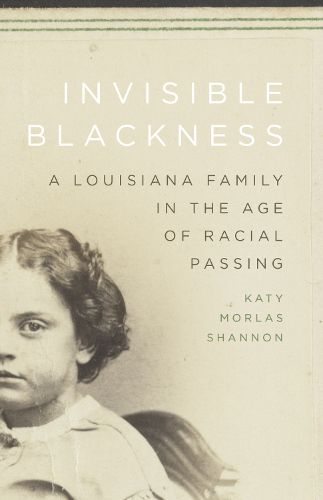Readings Newsletter
Become a Readings Member to make your shopping experience even easier.
Sign in or sign up for free!
You’re not far away from qualifying for FREE standard shipping within Australia
You’ve qualified for FREE standard shipping within Australia
The cart is loading…






Invisible Blackness explores the complex lives of Creoles of mixed race born in Louisiana to enslaved women and the white men who enslaved them. Individuals such as Alice Thomasson Grice forged their own identities--and often reinvented themselves--within the increasingly strict racial order of antebellum and postbellum Louisiana.
Alice Thomasson Grice occupied an unusual position among mixed-race Creoles of her era, as her white father recognized her formerly enslaved mother as his wife and raised Alice and her siblings as free people. After Alice married a white steamboat captain, Charles Grice, she and her children chose to identify as white. Invisible Blackness explores why Alice, her children, and friends in similar positions elected to cross the color line during the so-called "great age of passing" that spanned from 1880 to 1925.
While it's impossible to quantify the number of people who crossed the color line at any given time, evidence suggests that the rate of passing corresponded closely with the severity of anti-Black oppression and discrimination. By the 1890s, when the Supreme Court upheld Jim Crow laws and lynchings were on the rise, Black people who could pass had a strong motivation to do so. For the Grices, passing afforded the only means of social, economic, and political advancement available to them.
Drawing on a vast array of primary sources, ranging from sacramental records and bills of sale to wills and military pension files, Invisible Blackness sheds light on how this liminal group of individuals defined themselves and shaped their identities. The lives of the Grices and people like them underscore that race is both a social construct and a significant lived reality. Beyond these broad, pressing historical questions lie issues of love, family, and the universal quest for belonging that transcend time, place, and race.
$9.00 standard shipping within Australia
FREE standard shipping within Australia for orders over $100.00
Express & International shipping calculated at checkout
Invisible Blackness explores the complex lives of Creoles of mixed race born in Louisiana to enslaved women and the white men who enslaved them. Individuals such as Alice Thomasson Grice forged their own identities--and often reinvented themselves--within the increasingly strict racial order of antebellum and postbellum Louisiana.
Alice Thomasson Grice occupied an unusual position among mixed-race Creoles of her era, as her white father recognized her formerly enslaved mother as his wife and raised Alice and her siblings as free people. After Alice married a white steamboat captain, Charles Grice, she and her children chose to identify as white. Invisible Blackness explores why Alice, her children, and friends in similar positions elected to cross the color line during the so-called "great age of passing" that spanned from 1880 to 1925.
While it's impossible to quantify the number of people who crossed the color line at any given time, evidence suggests that the rate of passing corresponded closely with the severity of anti-Black oppression and discrimination. By the 1890s, when the Supreme Court upheld Jim Crow laws and lynchings were on the rise, Black people who could pass had a strong motivation to do so. For the Grices, passing afforded the only means of social, economic, and political advancement available to them.
Drawing on a vast array of primary sources, ranging from sacramental records and bills of sale to wills and military pension files, Invisible Blackness sheds light on how this liminal group of individuals defined themselves and shaped their identities. The lives of the Grices and people like them underscore that race is both a social construct and a significant lived reality. Beyond these broad, pressing historical questions lie issues of love, family, and the universal quest for belonging that transcend time, place, and race.